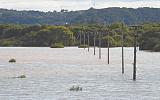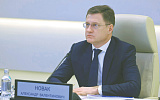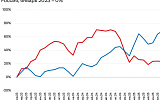The Russian air force received two of the 11 strategic bombers it bought from Ukraine in a move to bolster its nuclear strike capability.
A supersonic Tu-160 Blackjack bomber flew to the Engels air base near Saratov, 520 miles southeast of Moscow, where it was met by air force chief Col. Gen. Anatoly Kornukov. Another plane, a turboprop Tu-95 Bear bomber, arrived later.
In exchange for the bombers, Russia has agreed to write off $285 million of Ukraine's $1.8 billion debt for natural gas deliveries.
Ukraine inherited more than 40 Soviet strategic bombers after the 1991 collapse of the Soviet Union, but its government lacked funds to maintain and fly them and offered to sell them to Russia. The talks dragged on until a price was agreed on.
Acquisition of Ukrainian bombers would significantly strengthen the Russian air force, which now has only six Tu-160s, the equivalent of the U.S. B-1 bomber. Russia reportedly also has about 50 Tu-95s.
Russian Defense Ministry officials said that in addition to the bombers, Russia is also getting over 500 AS-15 Kent cruise missiles to be carried by the aircraft.
Aviation has always been the smallest leg in Russia's land-sea-air triad of nuclear forces, and the additional planes will bolster its long-range forces. However, the additional planes can carry only a limited number of nuclear warheads compared to those stationed on submarines and on land.
For example, if fully operational, the three Tu-95 bombers can carry 16 missiles each, and the eight Tu-160s can carry 12 each, for a total additional capacity of 144 warheads. Russia's current strategic nuclear arsenal is about 5,620 warheads, but it is shrinking because of arms control agreements as well as obsolescence.
However, the bombers and missiles may also carry conventional warheads and some of the Ukrainian planes may be also useful for spare parts. Russia also has some unfinished Tu-160s at the factory where they were manufactured in the Tatarstan region.
The delivery comes amid Russia's intense criticism of the United States for trying to modify the 1972 Anti-Ballistic Missile treaty which Moscow considers the foundation of nuclear arms control.
General Vladimir Yakovlev of Russia's Strategic Rocket Forces said recently that Russia would consider itself "freed from all arms control obligations" should the ABM Treaty be altered.





























